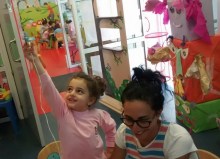The University of Groningen in the Netherlands has initiated the prestigious Rosalind Franklin Fellowship (RFF) programme to promote the advancement of talented international researchers at the highest levels of the institution. The RFF programme is co-funded by the European Commission (FP7-PEOPLE-2012-COFUND-Marie-Curie Action) and attracts the best researchers from all over the world to perform research in their own field of research. The Rosalind Franklin Fellowship programme aims to attract women, an underrepresented gender in all fields of research. The programme is aimed at women in academia, research institutes or industry who have a PhD and would like a tenure-track position leading to a full professorship in a top European research university.
Rosalind Franklin’s work is a shining example to young, brilliant female academics who are interested in a career in science. Her research at the laboratory of Kings College London contributed significantly to the discovery of the structure of DNA, however, she received no recognition. In 1962, the Nobel Prize in Physiology or Medicine was awarded to her colleagues, James Watson, Francis Crick, and Maurice Wilkins for solving the structure of DNA, who did not credit her in their publications. Franklin died of cancer at the age of 37, probably as a result of inadequate radiation safety measures. Had she survived, she would have undoubtedly been one of the most renowned female scientists of her generation in Europe.
In honor of her work, the ambitious Rosalind Franklin Fellowship programme was initiated by the Faculty of Mathematics and Natural Sciences at the University of Groningen in 2002. Since then 21 fellows from different parts of the world, have been appointed at the faculty in varying disciplines. In the last round of the programme, Dr. Lucy Avraamidou, Associate Professor of Science Education at the University of Nicosia has been offered a fellowship and a tenured position as an Associate Professor of Science Education.
Dr. Avraamidou will lead a group of doctoral and postdoctoral students in order to explore the ways in which out-of-school science activities (e.g., visits to science museums, science cafes, pop-up science shops, science festivals) impact young people’s science identities (age 10-14) or put simply, whether young people view themselves as successful science learners and as future scientists. This work aims to address an existing international challenge: young people, especially females, hold negative attitudes towards science and exhibit a decline of interest towards scientific careers.
The research will adopt quantitative and qualitative methods to data collection and analysis. The quantitative methods (surveys) will be used to assess young peoples science identities and the effect of various interventions (e.g., collaborating with young female scientists) on whether there are changes on how young people view themselves as successful science learners and as future scientists and whether age, gender, socioeconomic background, and family capital moderate these changes. The qualitative methods (biographical interviews) will be used to shed light on the reasons why young people, especially girls, hold strong or negative identities (e.g., family influences, societal influences, prior learning experiences) and if/how those were reconstructed because of their involvement in the interventions.

